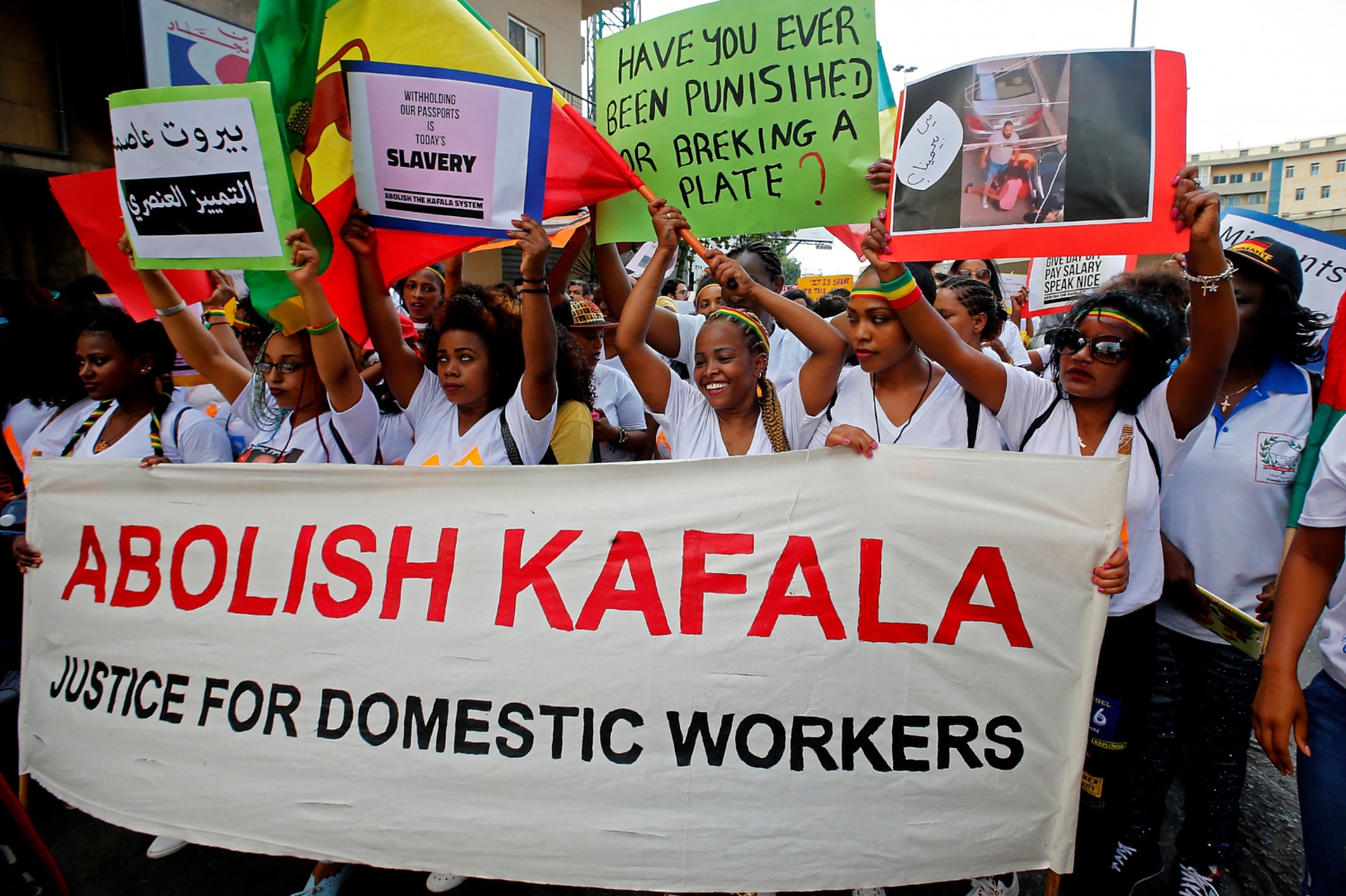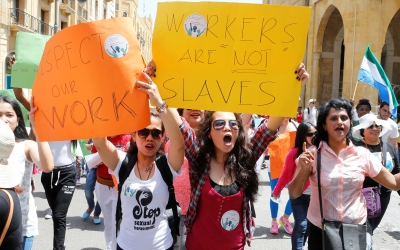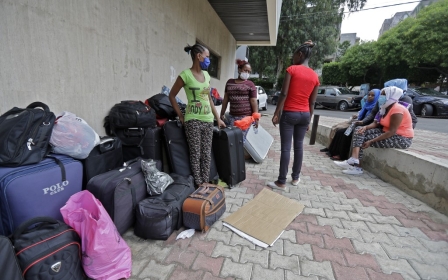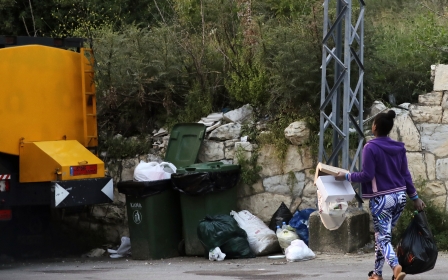Lebanon: Domestic worker sues employer in first lawsuit against kafala exploitation

When MH*, 38, travelled to Lebanon from Ethiopia in 2012 to work as a domestic worker, she did not foresee that she would be forced to live in captivity for almost eight years.
Like other foreign domestic workers in Lebanon, MH found herself deprived of basic rights and locked in a spiral of violence that put her life in danger.
'When I asked to call my family, she used to tell me to wait for them to remember that they had a daughter to check on'
- MH, former domestic worker
She is one of the many foreign domestic workers who entered the kafala system, a migrant employment sponsorship system used in Lebanon and in other Middle Eastern countries that legally ties migrants to their employers.
The kafala system is structured to fall into exploitation, as the relationship between a foreign domestic worker and their employer is extremely unbalanced. Human rights groups have long denounced the system, which allows employers to exploit and abuse workers, whose rights are unprotected.
But for the first time, a Lebanese court is handling a lawsuit against kafala exploitation. The case of MH is seen as representative of the working conditions of many foreign domestic workers in the country.
New MEE newsletter: Jerusalem Dispatch
Sign up to get the latest insights and analysis on Israel-Palestine, alongside Turkey Unpacked and other MEE newsletters
MH worked in a household in Lebanon for around 15 hours a day, daily, for almost eight years. Her employer never allowed her to take days off or holidays. Her employer also failed to pay her most of her earnings. When MH asked for her salary, her employer verbally and physically abused her.
"It was a nightmare. I was tortured, abused psychologically, physically, and verbally. I was not allowed to see anyone. When I asked to call my family, she used to tell me to wait for them to remember that they had a daughter to check on," MH said in a statement reported by UN Women.
MH was able to submit her case to the court and start a legal action against both her recruiter and employer after her mother contacted This is Lebanon, a small volunteer-based organisation run by former migrant workers and activists, which referred her case to Legal Action Worldwide. In 2019, MH reunited with her mother in Ethiopia following the intercession of lawyers.
"One morning, my employer received a phone call from a lawyer. He asked her to let me go. Two weeks after that, my employer sent me back to Ethiopia, but with no money," MH said in the statement.
But the psychological scars of her captivity are still raw.
Changing perceptions
The lawsuit filed by MH against her employer and recruiter is a ground-breaking case in the kafala system.
Fatima Shahade, Lebanon programme manager at Legal Action Worldwide, told Middle East Eye that the litigation has a strategic value.
"The litigation doesn't only target the legal aspect of MH's case, but it also aims to change the behaviour and perception of the community towards the kafala system," she said.
Legal Action Worldwide took charge of MH's case in 2019. Lawyers, caseworkers and psychologists worked with her to piece together the circumstances of her case to lay down a strategy.
"We have all available evidence, and we have coordinated with Doctor Without Borders [MSF] in Ethiopia to get a psychological report on her," Shahade said.
"The arguments are that MH's treatment constitutes slavery, human trafficking, racial and gender discrimination according to domestic and international law."
However, her former employer and recruitment agency did not attend the first hearing, which was set for 19 October. Judge Rania Yahfoufi then notified the defendants to show up at the next hearing, set for 10 February 2022.
If the defendants fail to show up at the next session, the judge can issue an arrest warrant upon a request by MH's lawyers.
There is no consensus figure on the exact number of foreign domestic workers in Lebanon, but the figure is estimated to be at least 250,000, most of whom are female and mainly come from African and Asian countries.
Though not every foreign domestic worker in the country suffers from exploitation, the kafala system can easily lead employers to take advantage of them.
'They can't escape'
Employers typically use local recruitment agencies to hire workers. Workers sign a contract, almost always written in Arabic, in their motherland before travelling to Lebanon. However, once there, they cannot leave the airport without their new employer.
The misinformation about what to expect in Lebanon, the inability to read a contract written in a foreign language, the need for financial resources, the search for a better life, and the weakness of legal protection trap many foreign domestic workers in a life of exploitation and abuse.
'They can't move, they can't escape, they can't even remain in the country if the employers don't want them any more'
- Fatima Shahade, Legal Action Worldwide
"When migrant workers come to Lebanon, they think they are coming to their dreamland and [will receive] a lot of money to send to their families. But when they set foot in Lebanon, employers take away their documents," Shahade said.
"They can't move, they can't escape, they can't even remain in the country if the employers don't want them any more."
Banchi Yimer, a 33-year-old domestic worker who has worked in several private households for seven years, said she had experienced exploitation in Lebanon.
"I used to sleep on the floor on the balcony because my employer didn't want me to sleep on the couch. I was also forced to work for my recruiter, who sent me to his relatives to do chores, for free," she told MEE.
"Instead of giving them chocolate as a gift, he sent them me."
Yimer was lucky enough to flee Lebanon in 2018 and move to Canada, where she has been living since.
In 2017, she founded Egna Legna Besidet, a community-based organisation that advocates for the abolition of the kafala system and assists foreign domestic workers, including mental health support and training, the first support of its kind offered to female foreign domestic workers in Lebanon.
Yimer now manages the organisation, which operates in Lebanon and Ethiopia, from Canada.
"Although MH's lawsuit is a positive effort for the cause, I don't think the case is going anywhere. I don't think foreign domestic workers will ever have justice for the abuses they have received," Yimer said.
Unbearable
A rampant local economic crisis, the Covid-19 pandemic and the political instability in the country have worsened the living condition of foreign domestic workers.
Multi-level crises in Lebanon have led the local currency to steadily lose over 90 percent of its value since October 2019 and have pushed more than half the Lebanese population into poverty.
Consequently, being employed as a foreign domestic worker in the country has become unbearable.
Hundreds of workers crowded embassies in Beirut during the pandemic lockdown as they tried to flee the country. For those who remained, living in Lebanon has become mentally challenging.
Olayemy, 30, travelled from Nigeria to Lebanon in 2019. She has worked with three families since then. She told MEE that a member of one household tried to abuse her sexually. After she managed to escape, the recruitment agency, which still owes her money, assigned her to another family.
"I haven't asked for help because I don't have any contacts here. Every day is the same for me. I can't go out. I don't have a room for myself, so I sleep on a mattress on the floor of the veranda, where they keep the laundry," she said, using only her first name.
'Justice will be served'
Working within the kafala system in some cases lead to workers dying. Although most such deaths are labelled in the media as suicide, the lack of transparency in the system does not allow for clarification of the circumstances.
Two migrant domestic workers die on average every week in Lebanon, according to Lebanon's General Security. Some workers have died after falling from buildings during escape attempts, while other cases have been reported as suicide, often with little investigation.
"Working inside a house for years without even seeing the sunlight, not being paid, not being able to call family, not being able to watch TV or listen to the radio, causes foreign domestic workers to disconnect with the world, and they may lose their minds," Yimer said.
In September 2020, the then caretaker government tried to ease the working conditions of foreign domestic workers by unifying the labour contract to rebalance the relationship between employers and domestic workers.
The new contract would have allowed workers to terminate their contract without the consent of their employer, as well as guarantee a weekly rest day, overtime pay, sick pay, annual leave, and the national minimum wage.
However, the Administrative Judiciary (Shura Council) suspended the implementation of the new contract system, ruling in favour of an appeal lodged by the Syndicate of the Owners of Recruitment Agencies of Lebanon against the proposals.
The case of MH has given hope of raising awareness about kafala exploitation among Lebanese and of it paving the way to create a public debate.
"We think justice will be served. This is the first case of its kind, but it is also an opportunity to open the door for abolishing the kafala system," Shahade said.
*Legal Action has asked MEE not to reveal the name of the former domestic worker due to the sensitivity of the case.
Middle East Eye delivers independent and unrivalled coverage and analysis of the Middle East, North Africa and beyond. To learn more about republishing this content and the associated fees, please fill out this form. More about MEE can be found here.






